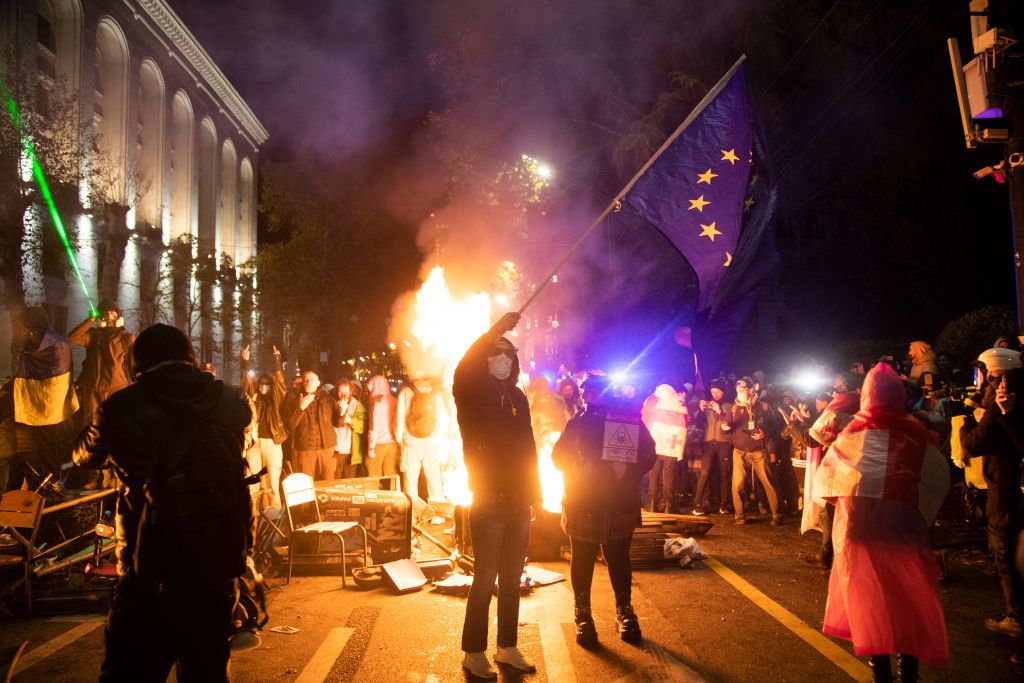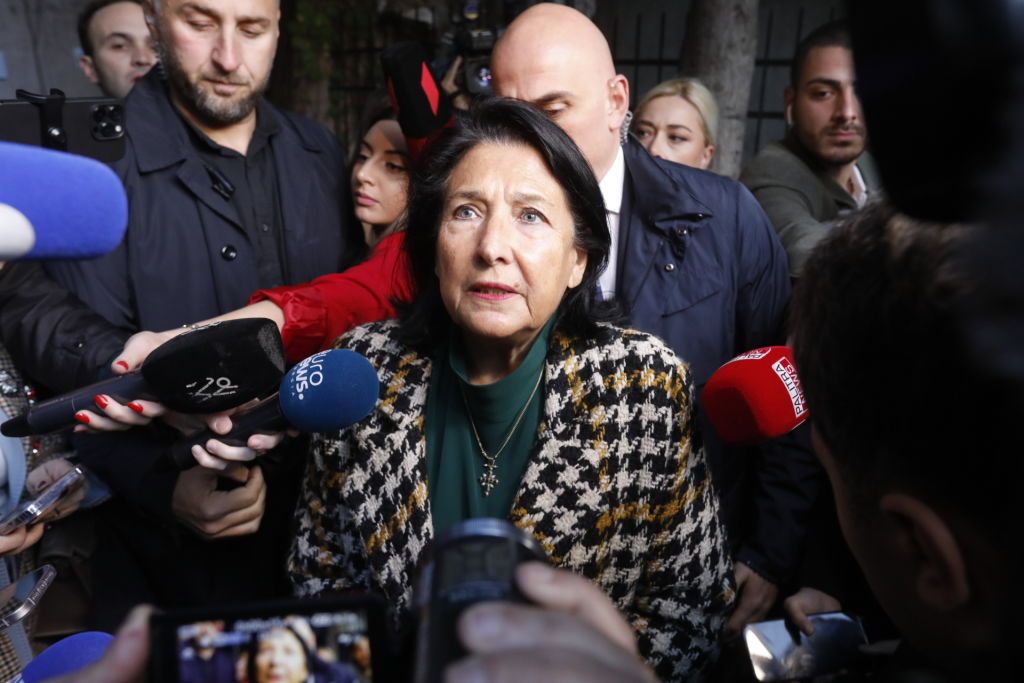Protests in Georgia, explained
After years of democratic backsliding, increasingly oppressive legislation, and cozying up to Russia, Georgians once again take to the streets their desire for change.

Police uses tear gas as protesters surrounded the front of the parliament building and threw fireworks and other objects during demonstrations in the Georgian capital, Tbilisi on Dec. 3, 2024. (Davit Kachkachishvili/Anadolu via Getty Images)
For the fifth day in a row, Georgians are holding massive protests against their government in the country's capital, Tbilisi.
The brewing dissatisfaction was ignited by the country's democratic backsliding under the leadership of the pro-Russian, increasingly illiberal government.
The final straw appeared to be the parliament elections won by the ruling Georgian Dream party, which many believe were marred by fraud, and the government's decision to pause the country's EU accession process until 2028.
Hundreds have been detained and dozens injured during an ensuing crackdown by riot police.

The Georgian Dream party has been in power since 2012 and spent years pledging to take the country into the EU. However, the party's rule has been marked by the development of closer ties with Moscow and the introduction of a number of repressive legislations that mimic that of Russia. Relations with the EU, as well as with Ukraine, have deteriorated.
The party is led by a controversial oligarch and former Prime Minister Bidzina Ivanishvili, Georgia's richest man, who has business ties in Russia. In the run-up to the election, Georgian Dream campaigned on a platform of reminding voters of the 2008 war with Russia, using images of war-torn Ukraine as a fear-inducing tactic to dissuade people from seeking closer ties with the EU.
For this reason, protesters in Georgia can be seen with EU and Ukrainian flags and symbols, as well as Georgia's national flag.
What are the latest protests in Georgia about?
Georgia's Oct. 26 parliamentary elections sparked a new cycle of protests, as opposition parties claimed the vote was rigged. Georgian Dream declared victory despite reports of ballot stuffing, intimidation, and other irregularities.
Opposition groups refused to recognize the result of the Oct. 26 parliamentary election and said the election was stolen. Georgia's pro-EU President Salome Zourabichvili said she would not recognize the results and called for citizens to join her in mass demonstrations.
Nonetheless, Prime Minister Irakli Kobakhidze, one of the leaders of Georgian Dream, said on Oct. 27 that parliament would approve the government.
Georgia's Central Election Commission took three weeks to count all votes and examine complaints about irregularities before announcing on Nov. 16 that Georgian Dream had received 53.93% of the vote, giving it 89 seats in the 150-seat parliament.


Protesters occupied a busy junction of downtown Tbilisi on Nov. 17 with tents, but the police dispersed them a day later. Protesters gathered again on Nov. 18, but police officers violently dispersed the crowds, demolished the camp, and detained several participants.
A new round of protests followed Kobakhidze's statement that Georgia's integration into the European Union could be postponed until 2028, prompting outrage among some in society, who are demanding changes in the country's political course.
Police reportedly used pepper spray and water cannons to disperse demonstrators in Tbilisi on Nov. 29. Protests then spread to Batumi, Zugdidi, Kutaisi, Telavi, Gurjaani, and other Georgian cities.
Over 220 people were arrested during the ensuing crackdown, with dozens reported injured as the Georgian police deployed tear gas and water cannons.
How are Georgia's relations with the EU?
The EU and U.S. called on Oct. 27 for an investigation into the irregularities during the election. The European Commission then announced on Oct. 30 that the process of Georgia's accession to the European Union has been suspended due to the actions of the Georgian government since the spring of 2024.
The talks remain "on hold as long as Georgia continues to move away from the EU, our values, and our principles," EU Ambassador to Georgia Pawel Herczynski said.
While the European Council had agreed in December 2023 to grant candidate status to Georgia, the Georgian government passed a controversial foreign agents law in May 2024, overruling a veto by President Zourabichvili.


The law, which mirrors similar Russian legislation targeting civil society, sparked mass protests in Georgia in the spring of 2024. Georgian Dream initially introduced the bill in early 2023 but scrapped it in March 2023 following widespread demonstrations.
The speaker of the Georgian parliament, Shalva Papuashvili, signed the law in June 2024 and the legislation came into effect on Aug. 1, requiring organizations that receive foreign funding to register with the Justice Ministry or face a fine.
In response, the EU de facto halted Georgia's accession process and froze 30 million euros ($32 million) in defense sector funding. Washington would also pause more than $95 million in assistance to Georgia due to the law, U.S. Secretary of State Antony Blinken said on July 31.
Following the outbreak of mass protests in late November, the EU's chief diplomat at the time, Josep Borrell, released a statement in support of the Georgian people "and their choice for a European future."
Borrell also noted that Kobakhidze's announcement to suspend EU accession talks "marks a shift from the policies of all previous Georgian governments and the European aspirations of the vast majority of the Georgian people, as enshrined in the Constitution of Georgia."

How has Russia reacted to the protests?
Publicly, Russia has refrained from openly siding with Georgian Dream but insinuated that outside forces are attempting to destabilize Georgia.
Kremlin spokesperson Dmitry Peskov said on Dec. 2 that the protests were a domestic matter for Georgia, but drew comparisons with Ukraine's Orange and EuroMaidan revolutions.
Ukraine's Orange Revolution in 2004-2005 was sparked by mass fraud during the 2004 presidential elections in favor of pro-Russian candidate Viktor Yanukovych. The mass protests resulted in an election rerun that was won by pro-EU candidate Viktor Yushchenko.
The 2013-2014 EuroMaidan Revolution broke out after President Yanukovych, who had been elected in 2010, decided not to sign an association agreement with the EU.
Georgia and Russia broke off diplomatic relations in the wake of the war in 2008 but the Georgian Dream government oversaw a gradual normalization of mutual ties.
The two countries resumed direct flights last year, while the trade relations between the two countries have continued to grow, increasing the South Caucasus' country's dependence on its northern neighbor.
Russia currently controls two Georgian regions — South Ossetia and Abkhazia — which together account for almost 20% of the country's territory.
Shortly before the election, Russian President Vladimir Putin issued a presidential decree on expanding visa-free entry for Georgian citizens who are working or studying in Russia. The decree came as the EU weighed potentially ending Georgia's visa-free access to the bloc.












